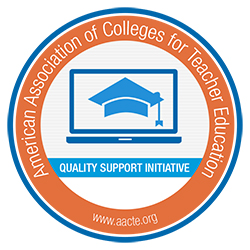28 Jul2015
By Deborah Koolbeck
Last week, the U.S. Government Accountability Office (GAO) released a report examining the roles of both the states and the U.S. Department of Education in identifying low-performing teacher preparation programs as well as in information sharing amongst stakeholders. AACTE and some of its members participated in this study, which took over a year for GAO to complete. In response to the report, AACTE issued the following statement, which received press coverage by Politico’s subscription service. Please send questions to dkoolbeck@aacte.org.
(July 24, 2015, Washington, DC) — AACTE and its over 820 member institutions stand firmly behind the reforms and innovations that are currently under way in teacher preparation programs across this nation, and we welcome the opportunity to be held accountable for our work. We support identifying low-performing programs, giving them time and resources to improve, and closing those programs that do not accomplish the necessary reforms. Unfortunately, states and the U.S. Department of Education have faced challenges in complying with the law requiring them to identify such programs, according to a report released yesterday by the Government Accountability Office (GAO).
28 Jul2015
By Mark LaCelle-Peterson

AACTE is pleased to open registration for its first in-depth Online Professional Seminar (OPS), Creating a Quality Assurance System, with the first 4-week section launching August 10 and additional sections beginning throughout the fall semester. Participants from AACTE member institutions receive a significant discount on the registration fee, but the seminars are open to the public as part of the Association’s Quality Support Initiative.
Already, hundreds of educators have participated in the two free introductory seminars, OPS #1: Building Quality Assessments and OPS #2: Using Data for Improvement. Additional sections of these two free seminars are still open for registration on a first-come, first-served basis.
27 Jul2015
By Robert C. Johnston
Starting this fall, the state of Georgia is strengthening its standards for licensing new teachers by requiring them to pass edTPA, a performance assessment indicating they really are effective and ready for the classroom.
The new requirement, part of a broad overhaul of the state’s structure for evaluating performance of both existing and brand new teachers, will take effect September 1. At that point, teacher candidates emerging from student teaching will receive their initial "induction" certification only after meeting a qualifying score on edTPA. In addition, teachers enrolled in Georgia’s GaTAPP nontraditional preparation program must pass edTPA prior to completing the program.
23 Jul2015
By Amanda Lester and Rodrick Lucero
Principals’ leadership is a critical factor in schools’ success, and school leader preparation programs play a key role in facilitating that success. But what are the components of programs that effectively prepare emerging principals to serve as leaders of learning in 21st-century schools?
AACTE, in cooperation with a national foundation, is conducting a brief survey of its members to better understand the landscape of university-based principal preparation programs: the context in which they operate; the challenges they face; and the degree to which improvements are seen as important. A report is planned for early 2016 summarizing the findings from this survey as well as others under way.
23 Jul2015
By Linda McKee
Last weekend, I was privileged to represent AACTE on a panel at the conference of the International Literacy Association (ILA). Our session, titled “Cultivating Literacy Achievement Through Quality Teacher Preparation,” touched on current program-improvement efforts, revision of the ILA standards for program recognition, variations in licensure requirements across the country, and policy-related challenges.
Joining me for the discussion were William Teale of the University of Illinois at Chicago, Rita Bean of the University of Pittsburgh (PA), Bryan Joffe of the School Superintendents Association, Chris Koch of the Council for the Accreditation of Educator Preparation, and others.
21 Jul2015
By Walter H. Gmelch
Today the development of leaders in our society is at a critical junction—too important to leave to chance. While the corporate world laments that its leadership development has progressed only from the Bronze Age to the Iron Age, I fear that many colleges and universities are still in the Dark Ages. In the educator preparation field, though, the AACTE Leadership Academy—for which I’ve been privileged to serve as a faculty member—helps illuminate the way for department chairs and deans to enter the Building Age of academic leadership.
21 Jul2015
By Deborah Koolbeck
On July 16, the U.S. Senate passed S. 117, the Every Child Achieves Act, to reauthorize the Elementary and Secondary Education Act (ESEA). The bill passed by a vote of 81-17, with three Democrats and 14 Republicans voting against the measure.
While 178 amendments were filed, including Senator Michael Bennet’s (D-CO) GREAT Act, Senator Bennet did not offer the GREAT Act amendment to be considered by the full Senate. In total, 66 amendments passed and will be incorporated into the final version of the Senate bill.
21 Jul2015
By Kayla Campbell

AACTE will host two webinars this fall on integrating the Common Core State Standards (CCSS) in educator preparation programs, thanks to a grant from the Learning First Alliance’s Get It Right campaign. These 60-minute webinars will highlight AACTE members’ successes and challenges in aligning their programs with CCSS.
Following the recommendations of the National Association of State Boards of Education report Common Themes, Individual Approaches: Six States’ Experiences With New Science Standards, these webinars will focus on four key areas of CCSS implementation: communication strategy, community involvement, policy advancement and alignment, and professional development and capacity building.
13 Jul2015
By Angela Maynard Sewall
Beginning this fall, AACTE will host a series of four free webinars on preparing effective principals through collaborations among higher education institutions and school districts.
The webinars will feature participants in the Wallace Foundation’s Principal Pipeline Initiative, a multiyear effort to strengthen the preparation and support of principals in six high-need urban districts: Prince George’s County (MD), Charlotte-Mecklenburg (NC), Denver (CO), New York City, Hillsborough County (FL), and Gwinnett County (GA).
The initiative, for which AACTE has served as a communications partner, builds on over a decade of research that identified four key parts of a pipeline to develop successful principals: rigorous job requirements, high-quality preparation, selective hiring, and on-the-job evaluation and support.
10 Jul2015
By Deborah Koolbeck
On July 8, the U.S. House of Representatives completed its work on the reauthorization of the Elementary and Secondary Education Act (ESEA). H.R. 5, the Student Success Act, passed by a vote of 218-213 (Roll Call vote no. 423).
While the final House bill with all agreed-to amendments has not yet been released, there are a few pieces that AACTE members will find of interest.
First, the Growing Education Achievement Training Academies for Teachers and Principals Act – the GREAT Act – is included in the House measure. The GREAT Act would not result in the systemic improvement of our nation’s teacher and principal preparation for several reasons. For one, the “training academies” it proposes are unlikely to involve higher education, which currently prepares 90% of all new teachers, and the bill would not require partnerships with PK-12 schools.
09 Jul2015
By Kayla Campbell
As a recipient of federal Teacher Quality Partnership grants over the past 6 years, Wichita State University (WSU) in Kansas has proven the value of investing in innovative educator preparation practices.
The Wichita Teacher Quality Partnership (WTQP) created extensive field-based learning experiences that prepare diverse and highly qualified teachers for urban school settings. Through the application of the professional development school (PDS) model in particular, the initiative fostered partnerships among the Wichita Public Schools (including 26 urban schools), The Opportunity Project (an early learning center), Head Start programs, local community colleges, and the College of Education at WSU.
07 Jul2015
By Robert C. Johnston
The views expressed in this post do not necessarily reflect the views of AACTE.
It happens far too often: PK-12 schools and higher education blame each other for educational shortcomings rather than collaborating on solutions or celebrating each other’s successes.
That’s why it was so encouraging to hear leaders from AACTE’s state chapters identify improved communication with PK-12 counterparts as a priority during last month’s State Leaders Institute. In the session I led on communications strategies, many teacher educators offered examples of how they are already building and strengthening these important relationships.
07 Jul2015
By Tim Finklea
More than 200 participants from a variety of education settings just completed the first Online Professional Seminar (OPS) in the series being offered by AACTE’s new Quality Support Initiative. With another 250-plus registrants signed up for the second free seminar starting next week, the series is off to a strong start—and there is still space in upcoming cohorts!
The focus of each OPS is a topic relating to quality assessment and/or accreditation. Seminars are 3-week, interactive online courses for current and aspiring professional educators, PK-16. Courses are open to all educators, whether AACTE members or nonmembers, and the first two seminars in the series—Building Quality Assessments and Using Data for Improvement—are offered free of charge. These two introductory OPSs can be taken in any order.
07 Jul2015
By Rodrick Lucero

Matthew J. Wales, CMP
Matthew Wales, AACTE’s senior director of meetings, events, and special projects, will be honored next month with an award from Meeting Professionals International (MPI). Wales will receive the award on behalf of the organization’s Potomac chapter (PMPI), on whose board he has served 5 years, including the past year as president.
The chapter was selected to receive the Recognizing Industry Success and Excellence Award for Community Achievement in Marketplace Excellence, which will be presented August 3 during MPI’s World Education Congress in San Francisco, California. PMPI will receive the RISE award for its Flipped Marketplace program, which in 5 years has helped double the cash sponsorship for its annual Mid-Atlantic Conference and Expo.
06 Jul2015
By Sharon Robinson
As another ambitious teacher preparation innovation captures national attention, I invite you to join me in taking stock of how widespread creative change has become in this field. The Woodrow Wilson National Fellowship Foundation and the Massachusetts Institute of Technology recently announced the launch of their brand-new research laboratory and graduate program to prepare teachers and school leaders. The educator preparation field, already rife with innovation, welcomes the new Woodrow Wilson Academy of Teaching and Learning as the latest partner in a robust entrepreneurial environment.
While I do not embrace the negative rhetoric that accompanied the new program’s announcement, I am keenly interested in the work. In fact, the Academy’s goals are quite aligned with those being addressed by many other educator preparation providers and organizations. Foundation President Arthur Levine and his partners at MIT will find themselves in good company as they pursue their particular reform interests and share their findings.








